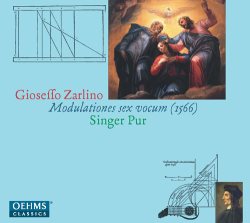| 
|
Goiseffo ZARLINO (1517 - 1590)
Modulationes sex vocum (1566)
In principio Deus [4:12]
Salve Regina [8:16]
Hodie Christus natus est [3:36]
Sebastianus Dei cultor [2:40]
Miseris omnium [3:22]
Exaudi Deus [7:25]
Miserere mei Deus [8:41]
Victimae paschali laudes [8:01]
Ascendo ad patrem meum [2:30]
Virgo prudentissima [2:38]
O quam gloriosum [3:14]
Litigabant Iudaei [3:41]
Pater noster - Ave Maria a 7 [10:17]
Singer Pur (Claudia Reinhard (soprano), Klaus Wenk, Markus Zapp, Manuel Warwitz (tenor), Reiner Schneider-Waterberg (baritone), Marcus Schmidl (bass))
Monika Mauch (soprano), Gerhard Hölzle (tenor)
rec. 20-22 February 2013, Himmelfahrtskirche, Munich-Sendling, Germany. DDD
Texts and translations included
OEHMS CLASSICS OC873 [68:41]
It is the fate of many music theorists that their compositions are largely ignored. Johann Joseph Fux, Johann Joachim Quantz and Johann Mattheson are just a few examples. Gioseffo Zarlino is another; I can't remember having heard any of his works before. That makes this disc especially interesting and significant. As Christle Collins Judd states in her liner notes: "Understanding Zarlino as a composer allows us to re-imagine or at least more richly imagine him as a theorist, just as knowing Zarlino as a theorist offers a window into the world of his compositions".
Zarlino was born in Choggia, a town on the Adriatic Sea coast, south of Venice. In the latter city he would spent most of his life. He received his early education from the Franciscans, took minor orders in 1537 and became a deacon in 1539. At that time he first worked as a singer in Choggia Cathedral, and then as organist. Around 1540 he was ordained as a priest, and in 1541 moved to Venice where he became a pupil of Adrian Willaert, at the time maestro di cappella of St Mark's. This was the post he himself occupied from 1565 to 1590. Among his pupils were Claudio Merulo, Vincenzo Galilei and Giovanni Maria Artusi. The latter would become one of the most important theorists around 1600.
Before him it was Zarlino who was considered as such, thanks to his treatise Le istitutioni harmoniche which was first published in 1558 and reprinted several times. This was followed by two further examples, printed in 1571 and 1588 respectively. The importance of Zarlino's most famous treatise is that he aims at bringing together speculative theory and practice. "The composer must not be content to master his craft; he should know the reason for what he does, and this can be discovered through an alliance of the rational and sensory faculties". Thus Claude V. Palisca sums up the tenor of Zarlino's book in New Grove. In its second part he develops a theory of consonances and tuning. Zarlino's rules of counterpoint are further developments of the teachings of Willaert. His own pupil Artusi then propagated them in his own writings.
It is telling that Palisca hardly addresses Zarlino's own compositions: "Zarlino's compositions, though learned and polished, are of secondary interest." This could well explain why so little - if any - of his oeuvre is available on disc.
This present recording is devoted to the complete Modulationes sex vocum, his second collection of motets which was printed in 1566. That was one year after his appointment as maestro di cappella at St Mark's. It is therefore unlikely that he composed them specifically for a performance at this cathedral. The texts are either liturgical or biblical, and several pieces are connected to feasts of the ecclesiastical year. Hodie Christus natus est is an antiphon for Christmas, Miseris omnium an Introit for Ash Wednesday and Victimae paschali laudes an Easter sequence. There is no very close connection between text and music in the form of madrigalisms. A rare example of text illustration is the rising figure which opens Ascendo ad patrem meum (I ascend to my Father), a Responsory for Ascension. However, the motets surely differ in character, for instance through the use of contrasting metres. Lively rhythms express the joy of Christmas in Hodie Christus natus est.
In all the motets the canon plays a central role. Only one of the motets omits this technique. Four motets include a canon on the cantus firmus which has a separate text. Two motets have the same cantus firmus: Ne reminiscaris, Domine - "Remember not, Lord, mine offences, nor the offences of my forefathers, neither take thou vengeance of my sins". Both are included in pieces for Holy Week: Miseris omnium (mentioned above) and the penitential Psalm 56 (57), Miserere mei Deus.
This recording shows that Zarlino's motets are beautiful and compelling, and that there is no reason to ignore them. It would be nice to have the opportunity to get to know his first book of motets (1549) as well. The sound of Singer Pur is different from that of most others because of the lack of an alto voice. The upper part is performed by a female soprano, in this recording sometimes joined by an guest singer (Monika Mauch). The second part is taken by one of the tenors. This leads to generally satisfying results, although I sometimes find that this part is a shade on weak side. A male alto would have given it more presence. That said, I have greatly enjoyed this disc. The ensemble is very good and the voices blend well. The text is probably not always clearly understandable; that aspect should be given more attention. The German pronunciation of Latin is rather odd; I can't find any explanation for that. Lastly, the miking is a little too close; the music would profit from a little more reverberation.
This disc firmly puts Zarlino on the map as a composer in his own right: he should be more than just a name in history books and encyclopedias.
Johan van Veen
http://www.musica-dei-donum.org
https://twitter.com/johanvanveen
 |
 |
|



 All Nimbus reviews
All Nimbus reviews








